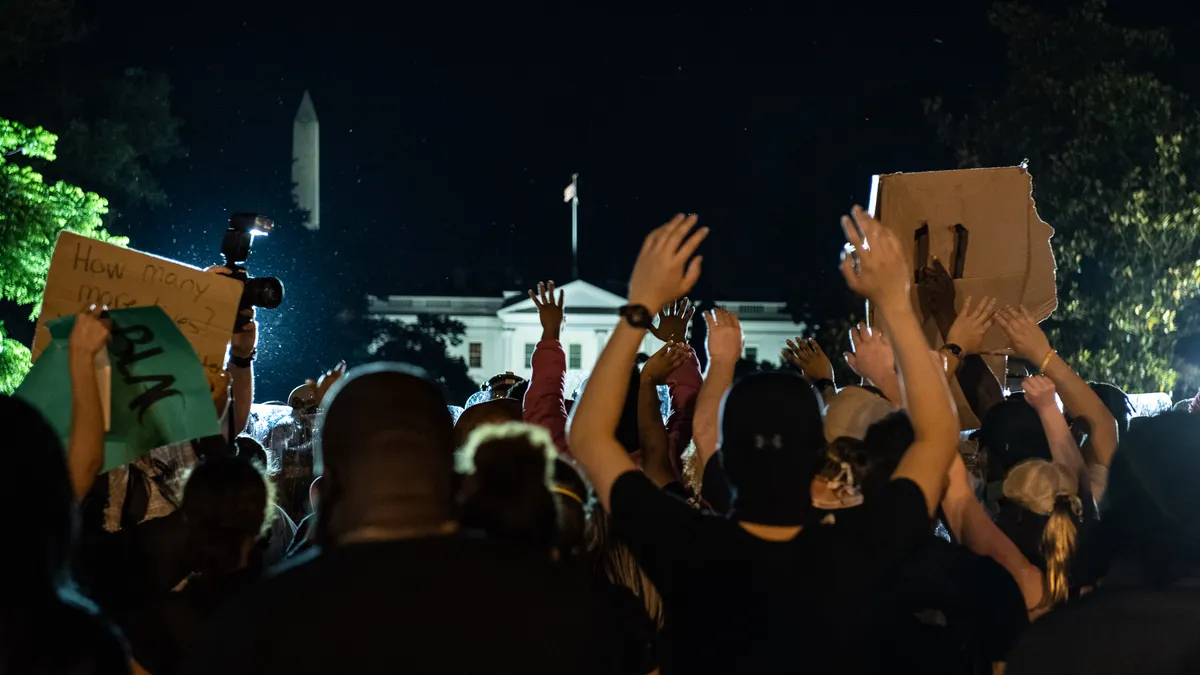Education leaders and organizations joined others Monday in condemning a Minneapolis police officer’s killing of a black man last week while urging students and community members to refrain from contributing to the wave of violence that continued to spread over the weekend.
Michael Casserly, the executive director of the Council of the Great City Schools, called the cellphone video of officer Derek Chauvin’s knee on George Floyd’s neck “a vignette in the ongoing story of injustice and racism that is our nation’s history and our current reality.”
He added that at a time when educators are teaching remotely and districts are facing budget cuts, schools must also “amplify” efforts to address inequity. “Let us ensure that our schools are safe havens where all children are respected and nurtured, where all children can achieve and grow, and where all children are guaranteed equity and justice,” he said in a statement.
In a press conference Monday, California state Superintendent Tony Thurmond discussed the difficulty he has had in knowing what to say publicly about Floyd’s death as well as those of Ahmaud Arbery and Breonna Taylor.
"Since March 13, I haven’t discussed anything other than the coronavirus," he said, but added he will now convene conversations with educators, elected officials and "leaders in every sector" to address "what we do in the classroom, why we haven’t done more to address implicit bias."
To begin the initiative, he announced an email address — [email protected] — for those who want to share what they're feeling or their interest in being involved. He said he will also create new online resources related to the issues.
"We must not let this moment go unnoticed," he said.
With most students across the country still learning from home, schools faced less risk protests would reach school property. The Long Beach Unified School District, however, did find graffiti on the exterior of two downtown schools, a spokesman said.
Los Angeles Unified School District Superintendent Austin Beutner suggested the school closures are a barrier during a time of turmoil.
“Today we should be in a classroom helping students process all that is happening around us,” he said in a statement. “Schools must be part of the solution because a great education is the most important part of the path out of poverty. But opportunity gaps for black students have persisted for more than a generation. The war on poverty declared more than 50 years ago seems to have been lost.”
The National Association of Elementary School Principals highlighted the role of administrators in addressing "grief triggers that highlight the trauma of inequality and discrimination."
"Principals — who research says are among the most trusted professionals — are tasked with advancing culturally responsive teaching and learning, which includes not only welcoming diversity in the classroom," the statement said, "but also teaching students how to navigate an increasingly racially, ethnically and socioeconomically diverse society."
Meanwhile, outgoing Atlanta Public Schools Superintendent Meria Carstarphen reminded students to pursue nonviolence.
“If you are choosing to be involved, please continue to lead by example,” she wrote in a blog post, urging them to lean on principals, counselors, teachers, school resource officers and other educators for support even though school is out.
Calvin Moore Jr., the CEO of the Council for Professional Recognition, which grants credentials to early-childhood educators, also called for restraint.
“We recognize that protest is a strong part of our country’s tradition, yet we should do so within the law and with respect for others and their rights,” he said in a statement.
Other organizations described steps they’re taking in response to Floyd’s killing.
The National Alliance for Public Charter Schools, for example, announced it is contributing $10,000 to the Equal Justice Initiative, which focuses on issues such as mass incarceration, excessive punishment and racial inequality.





















